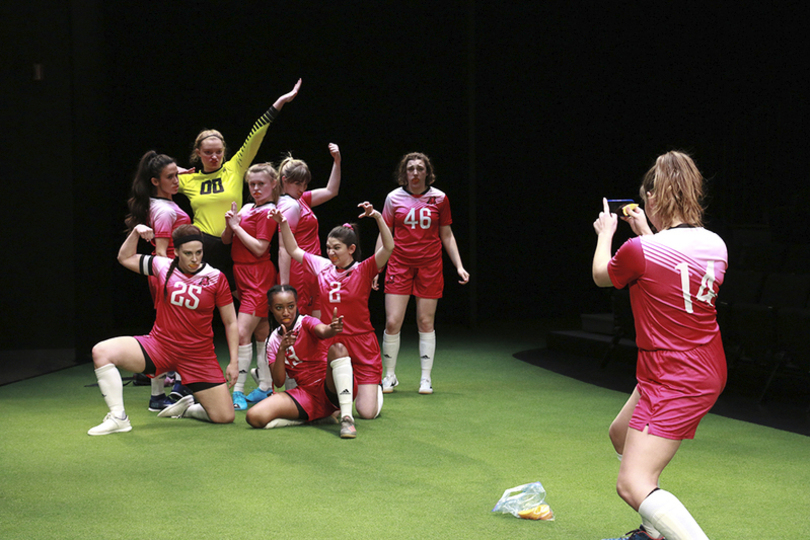‘The Wolves’ at Syracuse Stage portrays realistic struggles of teenage girls

Hannah Ly | Staff Photographer
“The Wolves” tells the story of a girls’ soccer team whose members face struggles such as anxiety, depression and conflicts with peers and parents.
With up to three small conversations overlapping at the same time, the actresses in “The Wolves” cannot lose focus of their lines, cues and rhythms in their actions. The actresses’ dialogue shows the reality of modern teenage conversation while they perform various soccer drills and passes at the same time.
Running at the Storch Theatre at the Syracuse Stage/SU Drama Theater Complex from Jan. 22 to Feb. 16, “The Wolves” follows a girls’ soccer team each weekend as they warm up and practice for games in an indoor soccer field in suburban America.
“The nine players are truly an ensemble, and the actors have to support each other implicitly,” director Melissa Rain Anderson said. “It takes a lot of concentration, and there’s no other play that I know that is like this that is this dense. It is a thrilling piece of theater.”
The scenes take audience members into the lives of teenage girls who are experiencing depression, anxiety and conflicts with both their parents and peers.
Rachael Logue, who plays the role of player #25, said that depending on where you sit in the theater, you may hear a different show than someone on the other side of the theater because everyone may not hear the same dialogue. She hopes this encourages people to come to see the show again in a different seat.

The cast of the production collaborated with a soccer coach and did scene work six days a week. Cassia Thompson plays player #13, and Rachael Logue plays player #25, the team captain. Hannah Ly | Staff Photographer
“You may be surprised at what actually they are talking about, what’s important to them, what they’re wrestling with day-to-day, and how raw the language is and how much they share in front of each other when there’s no adult in the room,” Anderson said.
The cast and crew of “The Wolves” began rehearsing on Jan. 2. They worked six days a week doing scene work and collaborating with a soccer coach. Prior to the show, only some of the actresses had played soccer. The soccer coach worked with them to sharpen their movements and build their confidence to make the drills almost second nature onstage.
Co-produced with Syracuse University’s Department of Drama, the production’s cast is a combination of student and professional actresses.
“To see a mix of student and professional actors work together and create a cohesive wonderful show even though they are each at different places in their development as actors sets this show apart from others I have worked on,” said Abby Boglioli, a stage management intern at Syracuse Stage and sophomore at SU.

The girls’ soccer team in the production is made up of nine teenage players. Claire David plays #00, the goalie of the team. Hannah Ly | Staff Photographer
“The Wolves” was created by playwright Sarah DeLappe, who wrote the numerous dialogues as a metaphor for playing soccer. While passing the ball, scoring with the ball and playing in aggressive soccer games, the girls take part in conversations that are also fast, raw and sometimes furious, Anderson said. Anderson previously directed “The Wolves” last year at the Repertory Theatre of St. Louis.
“It shows an audience how fierce young women can be, in both good and bad ways, and that the girls aren’t just sitting on the sidelines waiting for their turn,” said Logue. “We’re out there fighting each other for space and to be seen.”
During the course of “The Wolves,” Syracuse Stage is teaming up with the YWCA of Syracuse and Onondaga County’s “Soccer for Success” program, an initiative that focuses on teaching valuable life skills and healthy routines for adolescents, according to the press release for “The Wolves.” Syracuse Stage and “Soccer for Success” will be hosting a cleat drive at the theater during the duration of the production.
Anderson hopes that the performance will create a conversation about the different issues teenage girls face in their day-to-day lives.
“It can open a better conversation between generations,” Anderson said, “for the young people to be seen and to feel like they’ve been heard.”




